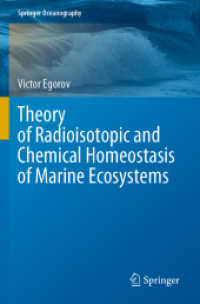- ホーム
- > 洋書
- > ドイツ書
- > Mathematics, Sciences & Technology
- > Earth Science
- > geography
Full Description
This book brings together a valuable collection of case studies and conceptual approaches that outline the present state of Amazonia in the 21st century. The many problems are described and the benefits, as well as the achievements of regional development are also discussed. The book focuses on three themes for discussion and recommendations: indigenous peoples, their home (the forest), and the way(s) to protect and sustain their natural home (biodiversity conservation). Using these three themes this volume offers a comprehensive critical review of the facts that have been the reality of Amazonia and fills a gap in the literature.The book will appeal to scholars, professors and practitioners.
An outstanding group of experienced researchers and individuals with detailed knowledge of the proposed themes have produced chapters on an array of inter-related issues to demonstrate the current situation and future prospects of Amazonia. Issues investigated and debated include: territorial management; indigenous territoriality and land demarcation; ethnodevelopment; indigenous higher education and capacity building; natural resource appropriation; food security and traditional knowledge; megadevelopmental projects; indigenous acculturation; modernization of Amazonia and its regional integration; anthropogenic interventions; protected areas and conservation; political ecology; postcolonial issues, and the sustainability of Amazonia.
Contents
Chapter 1. Overview Of The Indigenous Situation In The Pan-Amazonia: A Brief Introduction.- Part l: Indigenous Peoples In Amazonia: Territorial Context, Land Management, And Rights.- Chapter 2. A Voice In The Development Of Amazonia: The Constitutional Rights To Participation Of Indigenous Peoples.- Chapter 3. Indigenous Land Rights In Brazil: Challenges And Barriers To Land Demarcation.- Chapter 4. Reviewing Amazonian Countries Policies For The Protection Of Indigenous Peoples In Voluntary Isolation And Initial Contact (IPVIIC) And Its Implications For Territorial Dynamics And Indigenous Peoples' Development In Amazonia.- Chapter 5. Indigenous Land Management, Ecological Restoration And Ethno-Ecotourism Development: The Environmental Role And Empowerment Of The Fakcha Llakta Community In Ecuador.- Chapter 6. Ecotourism In The Yanomami Land: A Proposal For Territorial Management And Indigenous Ethnodevelopment.- Chapter 7. New Territorialities And Collective Ethnic IdentitiesIn The Brazilian Amazon Frontier, Rondonia State: Surui Paiter, Arara And Gavião Indigenous Communities' Land Claims And Alternative Cultural Landscapes.- Chapter 8. The Process Of Transition And The Tourism Social Contract In Indigenous Areas: The Case Of The Nova Esperança Indigenous Community, Rio Cuieiras, Brazil.- Chapter 9. Ayahuasca Lodges In The Peruvian Amazon: A Valid Alternative For Ethnodevelopment?.- Chapter 10. Alleluia And The Akawaio: The Spiritual Geography Of A Highland Revitalization Movement.- Chapter 11. Indigenous Higher Education At Insikiran Institute Of Roraima: The Challenges Of Social Participation And The Interculturalization Of Knowledge In The Northernmost Amazonia.- Part ll: Indigenous Lands And Peoples: Conservation And Ecological Aspects.- Chapter 12. Indigenous Participation In The Native Seed Market: Adapting Ethnic Institutions For Ecological Restoration In The Southeast Amazon.- Chapter 13. Cosmology As Indigenous Land Conservation Strategy: Wildlife Consumption Taboos And Social Norms Along The Papuri River (Vaupes, Colombia).- Chapter 14. The Non-Human Borderlands: Engaging With Ecological Justice And Indigenous Rights In Amazonia.- Chapter 15. Biodiversity And Knowledge Associated With The Wapishana People's Language: An Ethnolinguistic-Territorial And Conservation Case Study In The Amazon.- Chapter 16. Amazonia: Indigenous And Environmental Setbacks In Brazil.- Chapter 17. Hydroelectric Plants Construction, Rainforest Landscape Change And Impacts On Indigenous And Traditional Groups In Amazonia: From Balbina, Tucuruí To Belo Monte Contexts.- Chapter 18. Amazonia In Transformation: The Need Of Indigenous Empowerment, Innovative Ethnodevelopment Models And Ethnic-Ecological Accountability (Final Considerations).








